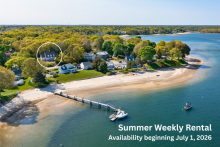Trustees of Reservations, Trout Unlimited oppose zoning change
Several conservation groups have formally opposed the proposed Hospitality, Recreation, and Entertainment district rezoning, which will be up for votes at the April 10 Special Town Meeting.
The proposal would rezone a nearly 1,000-acre parcel of land bounded to the south by Rte. 25 and to the north and west by Glen Charlie Road to allow large developments to be built in the area, which is currently mostly wooded.
Both the Trustees of Reservations and the Southeastern Massachusetts Chapter of Trout Unlimited opposed the redistricting, arguing that development there would degrade water quality, destroy habitats, and further exacerbate the effects of climate change.
The Southeastern Massachusetts Chapter of Trout Unlimited, in concert with other branches of the organization, wrote that development would harm the “environmentally sensitive drinking-water aquifer and severely threaten or possibly eliminate a population of Sea Run, or “Salter” Brook Trout in nearby Red Brook.”
“Red Brook is one of only a handful of tidal streams in Massachusetts that support Salter Brookies," said Matt Hoagland, President of the Southeast Chapter of Trout Unlimited. "It's a gem, and only here because of collaborative efforts by Wareham residents, local nonprofits and government agencies.”
The stream is a vital part of the habitat of Salter Brook Trout along with other migratory fish like eels and river herring, Hoagland explained.
“The system simply cannot withstand further water removals than currently exist nor can it handle additional loads of pollution. Both can be expected once the first domino (this zoning change) falls," Hoagland said.
Hoagland noted that Trout Unlimited, along with the Massachusetts Division of Fisheries and Wildlife and the Trustees of Reservations have invested “close to $4 million and tens of thousands of volunteer hours” on the conservation work in the area.
The Trustees of Reservations also expressed alarm about the impact the zoning change could have on natural resources. Development in the district would threaten nearby conservation lands.
“Since the removal of several dams, the native Brook Trout population has rebounded providing one of the most popular destinations for trout fishing in Southeastern Massachusetts,” wrote Thomas O’Shea, the director of coast and natural resources for the Trustees. “The historic and live herring runs in Red Brook also contribute to the region’s recreational fishing economy as they are a primary food source for stripe bass and other coastal fish.”
In addition to Red Brook, the land in question is home to Pine Barrens. O’Shea explained that Pine Barrens are globally significant and rare, and designated as priority, core, or critical natural landscape by the state.
Additionally, the Pine Barrens have been fractured by development, and the land up for rezoning is some of the last undeveloped Pine Barrens habitat in the region.
“Allowing dense development in this area would negatively impact groundwater resources through nutrient enrichment from runoff and wastewater disposal,” O’Shea wrote. “In addition to concerns about nitrogen, groundwater could be negatively impacted by dissolved oxygen depletion, other dissolved nutrients and chemical constituents and emerging contaminants of concern.”
O’Shea said that development could cause permanent damage to natural resources and “would likely result in an irreversible collapse of the region’s unique and sensitive ecosystems and would detrimentally impact quality of life for the local community.”
The zoning proposal will be up for votes at the April 10 Special Town Meeting, which will be held at noon on Spillane Field. Both letters are attached to this article.



.jpg)









